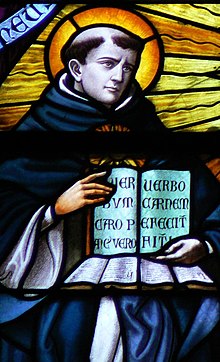
Back Pange lingua Catalan Chvalte, ústa Czech Pange lingua German Pange lingua Spanish Pange lingua Basque Office du Saint-Sacrement French Pange lingua gloriosi corporis mysterium ID Pange lingua Italian 입을 열어 구세주의 영광을 찬미하세 Korean Pange lingua Latin

"Pange lingua gloriosi corporis mysterium" (Ecclesiastical Latin: [ˈpandʒe ˈliŋɡwa ɡloriˈosi ˈkorporis miˈsteri.um]) is a Medieval Latin hymn attributed to Saint Thomas Aquinas (1225–1274) for the Feast of Corpus Christi.[1] It is also sung on Maundy Thursday during the procession from the church to the place where the Blessed Sacrament is kept until Good Friday. The last two stanzas (called, separately, Tantum ergo) are sung at Benediction of the Blessed Sacrament. The hymn expresses the doctrine that the bread and wine are changed into the body and blood of Christ during the celebration of the Eucharist.
It is often sung in English as the hymn "Of the Glorious Body Telling" to the same tune as the Latin.
The opening words recall another famous Latin sequence from which this hymn is derived: Pange lingua gloriosi proelium certaminis by Venantius Fortunatus.
- ^ Fassler 2014, p. 174.
© MMXXIII Rich X Search. We shall prevail. All rights reserved. Rich X Search